Related Research Articles
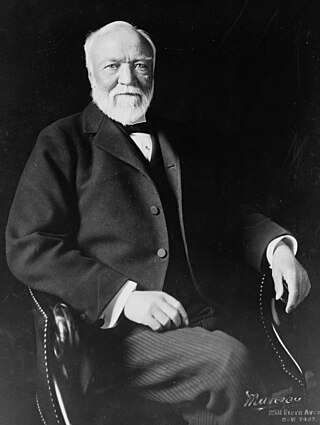
Andrew Carnegie was a Scottish-American industrialist and philanthropist. Carnegie led the expansion of the American steel industry in the late-19th century and became one of the richest Americans in history.

The Bethlehem Steel Corporation was an American steelmaking company headquartered in Bethlehem, Pennsylvania. Until its closure in 2003, it was one of the world's largest steel-producing and shipbuilding companies. At the height of its success and productivity, the company was a symbol of American manufacturing leadership in the world, and its decline and ultimate liquidation in the late 20th century is similarly cited as an example of America's diminished manufacturing leadership. From its founding in 1857 through its 2003 dissolution, Bethlehem Steel's headquarters were based in Bethlehem, Pennsylvania, in the Lehigh Valley region of the United States. Its primary steel mill manufacturing facilities were first located in Bethlehem, Pennsylvania and later expanded to include a major research laboratory in Bethlehem, Pennsylvania, and plants in Sparrows Point, Maryland, Johnstown, Pennsylvania, Lackawanna, New York, and its final and largest site in Burns Harbor, Indiana.

The United States Steel Corporation is an American steel company based in Pittsburgh, Pennsylvania, with production facilities in the U.S. and Central Europe.
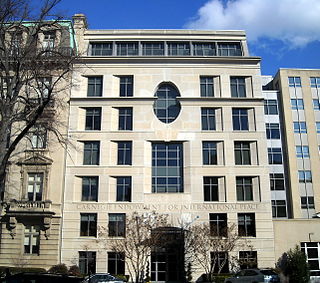
The Carnegie Endowment for International Peace (CEIP) is a nonpartisan international affairs think tank headquartered in Washington, D.C., with operations in Europe, South Asia, East Asia, and the Middle East, as well as the United States. Founded in 1910 by Andrew Carnegie, the organization describes itself as being dedicated to advancing cooperation between countries, reducing global conflict, and promoting active international engagement between the United States and countries around the world. It engages leaders from multiple sectors and across the political spectrum.

Philander Chase Knox was an American lawyer, bank director, statesman and Republican Party politician. He represented Pennsylvania in the United States Senate from 1904 to 1909 and 1917 to 1921. He was the 44th United States Attorney General in the cabinet of William McKinley and Theodore Roosevelt from 1901 to 1904 and the 40th United States Secretary of State in the cabinet of William Howard Taft from 1909 to 1913.

The College of Emporia was a private college in Emporia, Kansas, from 1882 to 1974, and was associated with the Presbyterian church.
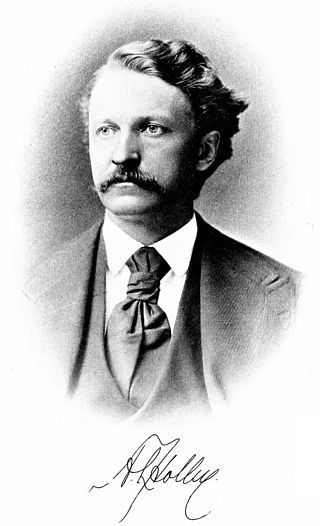
Alexander Lyman Holley was an American mechanical engineer, inventor, and founding member of the American Society of Mechanical Engineers (ASME). He was considered the foremost steel and plant engineer and designer of his time, especially in regard to applying research to modern steel manufacturing processes.
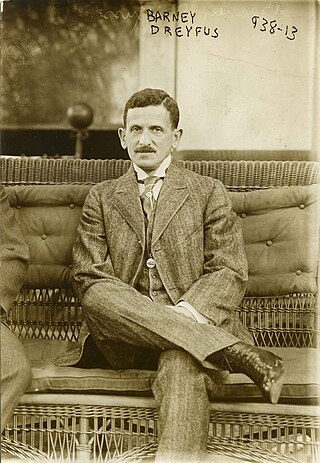
Bernhard "Barney" Dreyfuss was an executive in Major League Baseball who owned the Pittsburgh Pirates franchise from 1900 to his death in 1932. He was inducted into the National Baseball Hall of Fame in 2008.

The Lehigh Crane Iron Company, later renamed Crane Iron Company, was a major ironmaking firm in the Lehigh Valley from its founding in 1839 until its sale in 1899. It was based in Catasauqua, Pennsylvania, and was founded by Josiah White and Erskine Hazard, who financed its development through their Lehigh Coal & Navigation Company, which promoted the then-novel technique of smelting iron ore with anthracite coal. This was an important cost and energy savings technique, credited with eliminating the need for either expensive charcoal or coke producing processes and transport costs that proved central to the acceleration of the American Industrial Revolution.

John George Alexander Leishman was an American businessman and diplomat. He worked in various executive positions at Carnegie Steel Company, rising to President, and later served as an ambassador for the United States to Switzerland, the Ottoman Empire, Italy, and Germany.
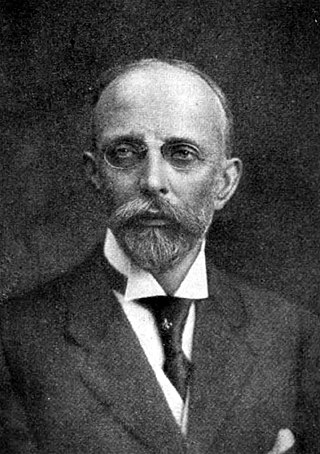
Charles William Henry Kirchhoff was a United States editor and steel expert.

John F. Fritz was an American pioneer of iron and steel technology who has been referred to as the "Father of the U.S. Steel Industry". To celebrate his 80th birthday the John Fritz Medal was established in 1902, with Fritz himself being the first recipient.

Eckley Brinton Coxe was an American mining engineer, coal baron, state senator and philanthropist from Pennsylvania. He was a co-founder of the Coxe Brothers and Company coal mining operation which became the largest producer of anthracite coal in the United States at the time.

William Brown Dickson was an American business executive in the steel industry. Starting his career as a common laborer in the Homestead Steel Works of Carnegie Steel at the age of 15, he rose to become vice president of Carnegie Steel, U.S. Steel, and Midvale Steel. He was an outspoken advocate for the end of the seven-day week and the twelve-hour day in the steel industry and became a proponent of "industrial democracy" based on stock ownership by employees.

James Gayley was an American chemist and steel metallurgist who served as managing director of the Carnegie Steel Company, and as the first vice president of U.S. Steel from 1901 to 1908. He is credited with many inventions which greatly improved the fields of steel and iron making. For his contributions in the field of metallurgy, he was awarded the Elliott Cresson Medal in 1909, and the Perkin Medal in 1913.
William Richard Jones was an American steelmaking inventor and manager highly valued by his last employer, Andrew Carnegie.

Edward Francis Blewitt was an American civil engineer, businessman, and politician who served as a Democratic member of the Pennsylvania State Senate for the 22nd district from 1907 to 1910. He was a maternal great-grandfather of Joe Biden, the 46th and current president of the United States.
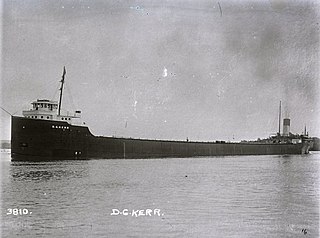
D.G. Kerr was a lake freighter, launched in 1916, for the Pittsburg Steamship Company. Ownership was transferred to US Steel, in 1952. She is considered to be a "600 footer", a vessel whose design was based on the J. Pierpont Morgan, built in 1903.

D.G. Kerr was a lake freighter, launched in 1903, for the Provident Steamship Company. She was renamed Harry R. Jones, in 1916, when a larger vessel was given the name D.G. Kerr.
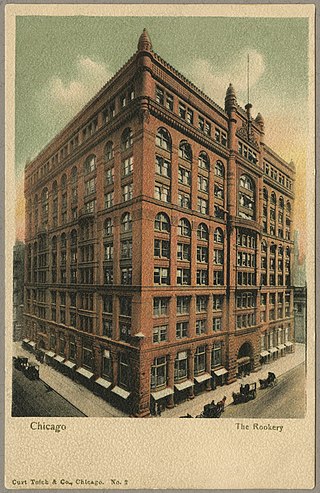
Julian Linus Yale was a prominent Chicago railroad entrepreneur and president of Julian L. Yale & Co., later sold to Samuel P. Bush's company. He was Carnegie Steel's representative for their railway business, and purchasing representative of the Big Four for the Vanderbilts. He was also the son of Yale Lock inventor Linus Yale Jr., and a member of the Union League Club of New York.
References
- 1 2 3 4 5 "David G. Kerr 1884". Lehigh University . Retrieved 2020-01-15.
- 1 2 "D. G. Kerr". Flickr . Retrieved 2020-01-15.
David Garrett Kerr was Vice President for mining and transportation at U.S. Steel from 1909 through 1932; this expanded the job he'd first held with Carnegie Steel and had retained when the Steel Trust was formed.